Alumnus Interview: David Antony Lofton (Accompanying '82, '84)

What was the spark that ignited your curiosity and, ultimately, your journey as a classical musician?
I came to Curtis as an accompanying major because I had a skill working with singers, which I discovered a few years earlier at my church, the historic Zion Baptist Church here in Philadelphia. It was under the direction of Reverend Leon Howard Sullivan at the time, and a lady there said to me, “I’m going to give a recital, and you’re going to play for it, and you’re going to coach me.” And I said to her, “What does that mean?” I was about fifteen, and she said, “Well, you have to help me with these arias and languages. I’m singing something in German, French, and Italian.” I mentioned that I didn’t know these languages, and she said, “Well, you need to figure it out.” She knew I could play the piano then, and sightreading was like opening a book. I just did it.
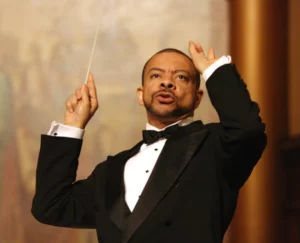
So, she gave me this big mandate to get tickets to see Leontyne Price at the Academy of Music and that I needed to be there to study this woman. I remember buying tickets for the sister above me and my mom. It was wintertime in January, and it had snowed. We all went to this recital, and from the first note, I was completely overwhelmed, and I remember it as though it were yesterday—every note, the entrance, the recital program, the encores, everything. We went backstage to meet her, and I was blown away by the whole energy and her pianist, David Garvey. That was my real kickoff and the inspiration to start digging into this whole opera thing. Leontyne was the first voice that really set me on this path, and it became an obsession.
At that point, the main branch of the Free Library here at 19th and Vine had LPs, and every Friday, I would head there from Central High School to sit in the listening department with a headset on and look at scores. At the time, they had scrapbooks on all the famous classical performers, including Leontyne, with three big tomes in silver on her. I would read these articles, reviews, and commentaries and listen to operas. Then, I felt the need to start exploring other singers, and since I was in the soprano range, of course, I went to [Joan] Sutherland and [Beverly] Sills and [Eileen] Farrell and [Maria] Callas and started to find my own tastes in what singers could do. It was a difficult thing because I began with Leontyne, and she has, for my taste, a freakish instrument in what she could do live—the pianissimi and all that spinning stuff.
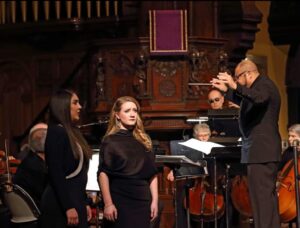
So, there were moments of disappointment, thinking, well, if she could do it, why can’t this other lady do it? I began to discern the difference in ability versus technique. I had to absorb the different types of sopranos—[Birgit] Nilsson and Sutherland sang a different repertoire from [Renata] Tebaldi and [Leontyne] Price. Callas was in a world of her own. I did not like Callas at all initially. To me, it was unpleasant, and I kept thinking that there must be something that I was missing. And as my listening skills developed and my ability to get a sense of what was going on linguistically, the whole Callas thing sort of exploded with me. Of course, I was also dealing with other voice ranges, [Sherrill] Milnes and [Plácido] Domingo. Unfortunately, I never heard [Franco] Corelli live—one of the greatest disappointments in my life because he’s one of my favorite tenors.
During these formative years, what other circumstances led you to pursue a career as a vocal coach?
I was fortunate at Central High School. We had a full choir, a full orchestra, and a jazz band; we even built a harpsichord. The music director, Italo Taranta, was unique—brilliant and inspiring. He challenged us and had me do score reading in high school and reduce quartet movements.
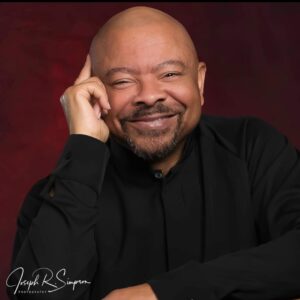
During my first year, he told me I was going to be the accompanist for the choir next year. One day, he put a Carmina Burana score on the piano—now, at that time, I had never heard of Carl Orff and had no idea what it was—and I remember opening the first page and thinking, oh, I’m in trouble. But we started these rehearsals, and I became addicted to this piece, especially the rhythmic challenges.
At the time, Central was still all male. Two blocks up the street was the girl’s high school, and they, too, had a full choir. And in the spring, we always combined orchestras and choirs. And thus, we did Carmina; we did Elijah cover to cover, Messiah—all this big stuff. It was part of my fabric at that point. In my church, we also did Mendelssohn’s Elijah, Handel’s Messiah, Rossini’s Stabat Mater, and Dubois’s Seven Last Words. So, coming up, I heard that kind of classical music in the sacred repertoire, and once I had to play that recital [with the soprano, Louise Dorsey at Zion Baptist Church] and figure out what coaching meant, everything started to snowball.
David Antony Lofton performs “Crucifixion,” with fellow Curtis alumna Karen Slack (Opera ’02).
To think that I have worked with Shirley Verrett, Justino Díaz, and Tito Capobianco, who was historic in his involvement with Callas’s debut and Sills—my experiences ran the whole gamut. I was even an usher and a gopher for Beverly Sills when she sang at the Mann Music Center. I’ve had such an array of experiences with these people, and I realize now that my experiences have been unique. I am very fortunate—the teachers who have influenced me, the pushes they’ve given me, and the positions they put me in. There’s a lot to be thankful for.
Tell me about your time here at Curtis. What was it like studying with Vladimir Sokoloff?
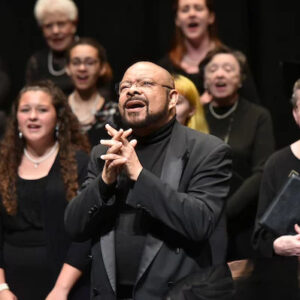 In my first lesson with Dr. Sokoloff, I played something like Beethoven’s Piano Sonata No. 7 in D major, Op. 10, No. 3. He assigned me several pieces and mentioned the Chopin Étude, Op. 25 No. 11, ‘Winter Wind’ in A minor; the Schumann Toccata in C major, Op. 7; and others. I’m sitting there looking at him like, when do you expect all this to be learned? He said, “Oh, next week.” I was paralyzed. My eyes were as wide as an LP record at that point. And I looked at him, not wanting to react but thinking I was in trouble. At the time, Curtis had a tradition of lending pianos to students who didn’t have a Steinway grand piano. So, they put this grand piano, an old model with carved legs, in my living room. I loved it. There I was practicing these pieces, and my schedule was ridiculous. Fortunately, I had a couple of churches around that liked me and gave me access to their buildings, so I could practice late instead of trying to do that at home.
In my first lesson with Dr. Sokoloff, I played something like Beethoven’s Piano Sonata No. 7 in D major, Op. 10, No. 3. He assigned me several pieces and mentioned the Chopin Étude, Op. 25 No. 11, ‘Winter Wind’ in A minor; the Schumann Toccata in C major, Op. 7; and others. I’m sitting there looking at him like, when do you expect all this to be learned? He said, “Oh, next week.” I was paralyzed. My eyes were as wide as an LP record at that point. And I looked at him, not wanting to react but thinking I was in trouble. At the time, Curtis had a tradition of lending pianos to students who didn’t have a Steinway grand piano. So, they put this grand piano, an old model with carved legs, in my living room. I loved it. There I was practicing these pieces, and my schedule was ridiculous. Fortunately, I had a couple of churches around that liked me and gave me access to their buildings, so I could practice late instead of trying to do that at home.
Dr. Sokoloff put me in a lot of interesting circumstances. First, he assigned me many chamber pieces and asked me to play for every kind of lesson possible—viola, double bass, and trombone lessons. I was forced through all this repertoire—just absorbing it. Of course, working with these Curtis kids, who were all extremely talented and had to be able to open scores and read them and make sense of what they were doing, I didn’t realize it at the time, but it was having a great effect on my ability to perceive and interact immediately. My sight-reading skill at the time was thankfully on the mark. That helped me survive many difficult circumstances because he had me playing lessons all the time.
Tell me about accompanying the late Todd Duncan and serving as his vocal coaching apprentice.
[Mr. Duncan] took such an interest in my work. He would say to me, “Remember, son. You’re going to see these singers every day of the week. I only see them on Saturdays, and you must be my ambassador.” Everything that we work on in these lessons, you must keep it going with them during the week. And so, he would put me through such rigor. He would stop a lesson and ask me: “What did you just hear? What do you think needs to be done here?” It forced me to a level of listening I had not experienced because the piano playing part had to be second-natured. I couldn’t even really think about my playing. I had to think about what was going on with the singer, what was good, what needed improvement, and the whole language thing.
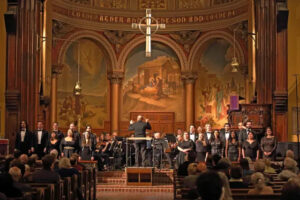
All of this helped me be a better vocal coach—the sense of breathing those years with Todd Duncan, knowing what good singing was about, and learning from him all of these technical references. He called that “Duncan Junk.” I ultimately found that I had developed an empathetic sense of the whole musculature of what was going on with the singer. I also had a very good ability to imitate, which is part of knowing what’s going on inside. Working with a singer has its challenges because with a pianist, you can look at their hands and say, well, you’re not doing this, you’re not doing that. It’s a little more mysterious with the singer because their instrument is internal. Being able to absorb all of that at Curtis and being put into so many circumstances—instrumental, vocal, opera, recitals—all that experience came together and helped me to become an opera coach.
Watch Black Opera Productions’ interviews with David Antony Lofton, Joseph Joubert, Kevin Miller, Cliff Jackson, and Howard Walkins, five collaborative pianists who have helped to foster the next generation of opera coaches and singers.
Could you share some particularly fond memories or moments you have of your time here, both as a student and as a faculty member?
[At one point, Curtis] sent me on a tour of Europe. We performed in France, Italy, Salzburg, and Spain. One of my fondest memories was walking into the Mozartiam to play. It was overwhelming and humbling, to say the least. This was with a baritone, Donald Cullop (Voice ’81), who, somewhere around that time, won the Joy of Singing Award, which was a huge thing. The string quartet was Margaret Betjer (Violin ’80), Tom Turner (Viola ’81), Ramon Bolipata), and Hirono Oka (Violin ’82).
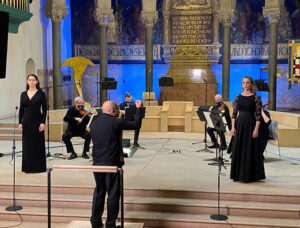
Every day, we were in a different place and different circumstances. I remember one particular cathedral in France—it was absolutely gorgeous. We walked in, and as we talked, all I could hear was this reverberation. We were to play the Beethoven Violin Sonata No. 8, Op. 30, No. 3, and when we started rehearsal, all we heard was sound rolling around. I played the whole concert and never touched the pedal because the church acoustic was the pedal—you didn’t need it. At times, we had to slow things down. It was a big learning experience, and we had a great time working with Donald. He is a very special talent, and his ability to sing lieder and chanson was unparalleled. He would sing these things in France, and people would run up to him and start talking to him in French. He didn’t understand them. He did not speak a word of French, but his singing was so incredible.
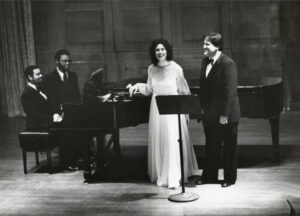
Dr. Sokoloff and John de Lancie (Oboe ’40) put me in a group with Laura May Davis (Voice ’83) and Jack Clay (Voice ’81). We did a series of concerts at what we called “Little Carnegie Hall,” what’s called Weill Concert Hall at Carnegie Hall, along with a string group. Walking into Carnegie Hall—the name has such a history and austerity to it. I remember getting chills walking through the door.
There was a time when I was a faculty member here at AVA and probably still at Curtis. Gregory Hopkins (Voice ’84) tenor, an alum of Curtis, was a featured soloist in that concert on the main stage at Carnegie Hall. I was hired to conduct the whole concert with Harlem Boys Choir and the orchestra. At the rehearsal, just walking in from backstage and looking up at the chandelier, I thought this couldn’t be real. It’s amazing how a room can be so humbling because of the history that it holds. Those are some of my huge memories at Curtis. Those events were monumental.
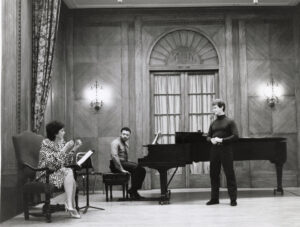
What advice do you have for current Curtis students and recent alumni?
Well, my first advice is to take full advantage of all the resources the school possesses—a plethora of availability and knowledge—and utilize the minds there. It’s so gratifying to see people that work hard in the studio, and then they’re up there on the big stages, people that I still maintain friendships with—Ailyn Pérez, Joyce Di Donato, Michael Fabiano, Stephen Costello, Burak Bilgili, and Nancy Fabiola Herrera, and even Juan Diego Flórez (Voice ’96). When I think of the fact that I have been privileged to work with these people and to perform with them in various parts of the world and then to be able to witness their skill and their ability is very interesting. You get to know some of their ups and downs personally.
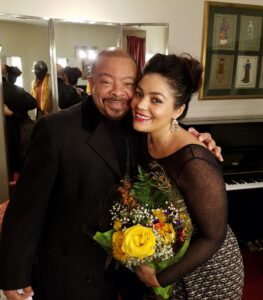
Interview with David Antony Lofton by Ryan Scott Lathan. This interview was edited and condensed.
ABOUT DAVID ANTONY LOFTON
Master opera coach, conductor, pianist, and Curtis alumnus David Antony Lofton‘s (Accompanying ’82, ’84) path as a solo pianist was forever altered the night he heard the great operatic soprano Leontyne Price live at the Academy of Music. Sparking a newfound curiosity and a lifelong love affair with opera, he explored the sounds of other singers, one vinyl record after another, at the Free Library of Philadelphia. This fateful encounter would ultimately lead him to Curtis to study with Dr. Vladimir Sokoloff. Here he served as the accompanist and vocal coaching apprentice of the late Todd Duncan for eight years and became a faculty member from 1982–92, teaching concurrently for two of those years while still a student at the school. Since 1985, he has been a Master Vocal Coach at the Academy of Vocal Arts (AVA), and the exclusive Music Director and Conductor of the premiere opera school’s “Jubilate! A Concert of Sacred Music” for twenty-two years.
Read David Antony Lofton’s bio HERE.
Photo credits: 1, 2, 4, 6, 7.) Banner image and other noted photos by Don Valentino. 3.) Photo by Joseph R. Simpson. 4.) Image of Mr. Lofton courtesy of Neumann University. 8.) David Anthony Lofton, Laura May Davis, Jack Clay, Carnegie Hall, 11/7/1979; photo by Henry Grossman. 9.) Anna Moffo masterclass with Robert Wagner and Mr. Lofton, 4/15/86; photo courtesy of the Curtis Library and Archives. 10.) Mr. Lofton and soprano Ailyn Pérez backstage at the Metropolitan Opera; photo courtesy of Mr. Lofton.


